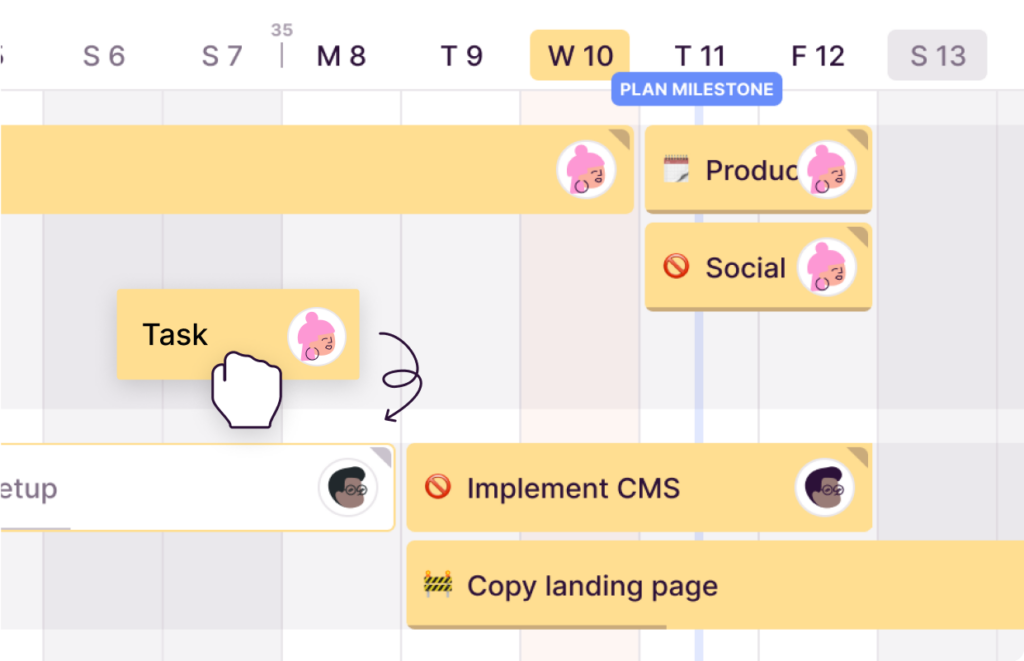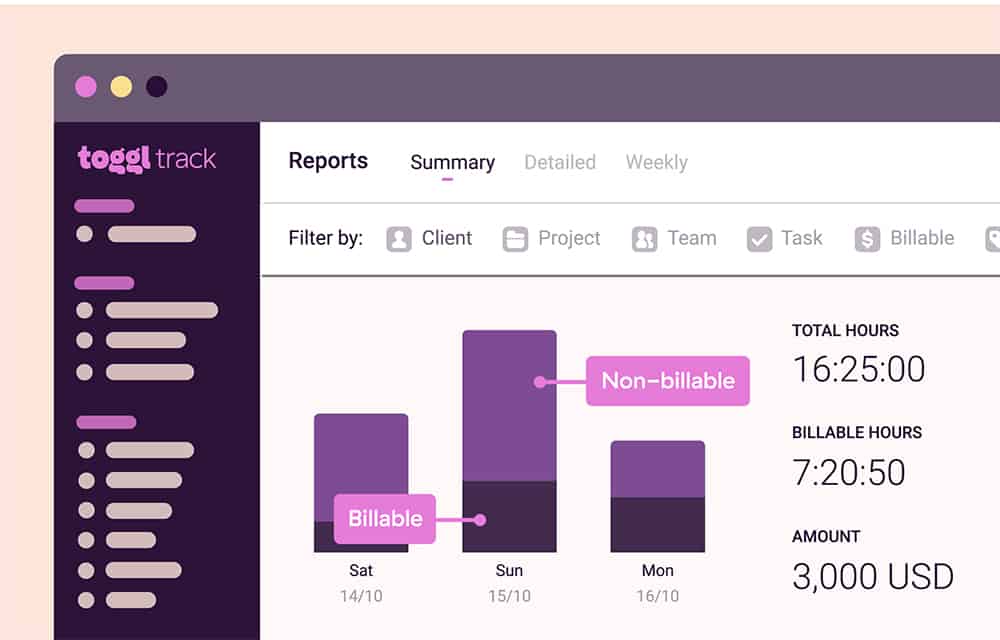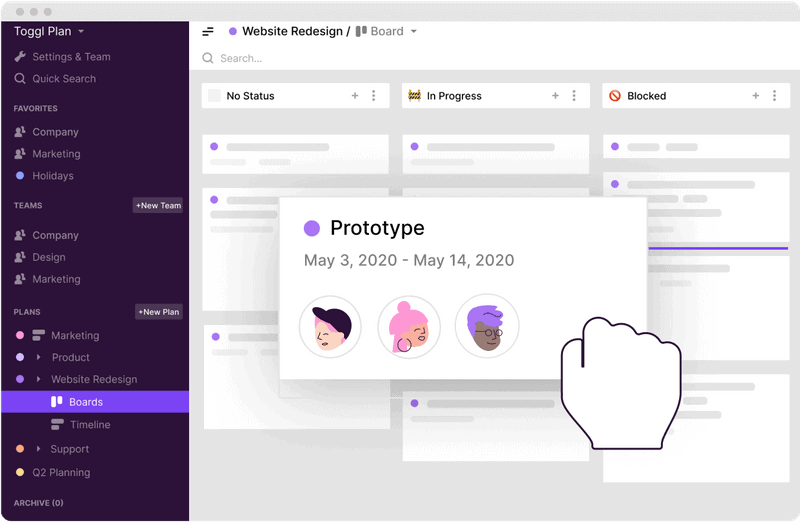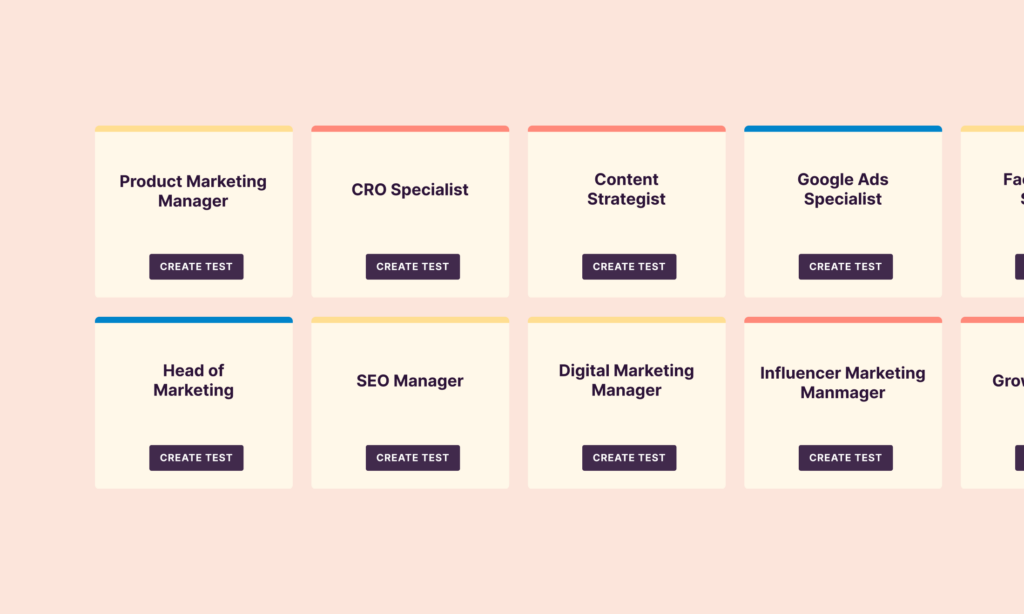Stepping into a marketing project manager role?
This article takes you through the nuts and bolts of a marketing manager’s role—including responsibilities, skills, and frequently asked questions.
At first, the wide range of responsibilities a marketing manager shoulders feels overwhelming.
After all, a marketing project manager oversees all the things related to marketing. Their responsibilities range from aligning marketing efforts with company goals and planning and executing marketing campaigns to ensuring maximum utilization of the marketing team.
But, worry not.
You already know the marketing side of things. With an in-depth understanding of the role and right processes and marketing project management software you should excel at it.
Read this article to learn:
Let’s begin.
What is a marketing project manager?
Project management in marketing is the process of organizing marketing campaigns and leading a marketing team to achieve business objectives within set constraints like budget, time, and scope.
A marketing project manager is in charge of the marketing project management process.
This includes:
- Creating project objectives, timelines, and processes
- Assigning tasks to the right team members
- And making sure the project progresses according to the plan
Just like all other PMs, a marketing project manager has a supervisory role and has to wear a bunch of hats to stay on top of:
- Project objectives (in line with the organization’s goals)
- Work planning and organization
- Resource availability and capacity planning
- Task management and prioritization
- Timelines and milestones
- Communication with team and stakeholders
Let’s look at the responsibilities that define a marketing project manager’s role.
What does a marketing project manager do?
If you pulled a random marketing duty out of a hat, you could safely assume that a marketing project manager either does it or oversees someone who does.
A marketing project manager has a wide range of responsibilities and requires insight into the jobs of virtually everyone around them.
As a result, a marketing manager’s responsibilities go beyond scheduling and administration.
Let’s look at some critical responsibilities:
1. Build and run project timelines
A project timeline is a set of tasks, milestones, and dependencies arranged on a horizontal time or date line.
A timeline provides a clear overview of a project’s schedule. Everyone involved in the project can see who’s doing what and when. By not planning and following a timeline, a marketing project often overruns its schedule and budget.
As a marketing PM, your responsibilities include:
- Divide the marketing campaign into phases
- Determine the tasks, dependencies, and resources needed to complete each phase
- Identify, book, and assign resources for each task depending on availability and capacity
- Ensure tasks get done on time to meet milestone deadlines
- Adjust the timeline based on run-time changes and contingencies
- Communicate changes with the client
You can create a timeline using something as simple as Excel.
However, it’s hard to collaborate on a spreadsheet project schedule. Plus, as the project grows things can get messy and chaotic.
Using a visual timeline software, like Toggl Plan, you can create a project schedule in just a few clicks. And when things change, as they will, you can adjust the schedule with simple drag and drop.

2. Work with leadership to turn strategy into action
“Leadership” typically includes directors, vice presidents, or CEOs in larger companies. In smaller agencies and consultancies, leadership could mean the business owner or a client.
Typically, the leadership defines annual goals along with a broad strategy to achieve them.
From there, it’s up to the marketing manager to convert the marketing strategy into actionable project plans.
While planning marketing campaigns the marketing manager has to ensure:
- They are profitable
- The execution is logical and efficient
- The resources are well-spent
- Risks are low and manageable
- Potential capacity changes or other resource problems are accounted for
- The team is productive and not overwhelmed
- There’s a defined process for every project activity
- Documentation, communication channels, and other tools are ready
In addition, the marketing manager also needs to keep the stakeholders up to date with project progress.
That way stakeholders have visibility into what’s happening. Plus, they can take decisions about taking up new projects or hiring new people/vendors to get projects done.
With Toggl Plan, you can share a read-only view of the timeline. That way stakeholders can stay on top of projects without being bothered about the details.

3. Collaborate with marketing team members
As a marketing PM, you work with copywriters, editors, and graphic designers.
You need to know a little bit about each team member’s work. So that you can:
- Stay on top of the project’s schedule
- Manage conflicts and risks that can affect deadlines
- Come up with accurate time estimates for tasks
- Help team members solve common execution problems
- Identify training needs to upskill your team
- Make better hiring decisions
Of course, each team member has to do their part. But as the marketing project manager, you’re the conductor of the orchestra. You’re the one who has to point them in the right direction. It’s your responsibility to ensure that every team member contributes to project success.
In crunch situations, you may even have to step in and do the legwork yourself.
4. Manage communications with internal and external stakeholders
What are stakeholders?
Stakeholders are people who are actively involved in or impacted by the project. Whether they are “internal” or “external” simply describes whether they are in-house or not.
So here are some examples:
| Internal stakeholders | External stakeholders |
|---|---|
|
|
As a marketing project manager, you’re right at the center.
You’re responsible for keeping all the stakeholders up-to-date, involved, and happy through all the stages of the project.
Your role involves a lot of coordination, including:
- Balancing between different stakeholder expectations, priorities, and personalities
- Having the right buy-ins
- Regularly updating everyone on the progress
- Managing complex inter-personal and inter-team relationships
This translates to lots of messages, meetings, documentation, and getting approvals.
5. Reporting and analysis of key results
Here are some things marketing project managers have to monitor, analyze, and report:
- Task and subtask milestones—are they going according to schedule?
- Resources are spent vs. original estimates and budget
- Problems or bottlenecks and what it takes to solve them
- Project progress vs. initial project plan
Regularly analyzing progress leads to better insights and more informed decision-making, both crucial for project success.
Plus, you can accurately invoice clients based on the number of hours worked.
A time tracking tool like Toggl Track helps you track the time spent by your team on tasks. Plus, it’s able to generate reports that you can use to invoice your clients accurately.

What skills do you need for the marketing project manager role?
Marketing project managers need a combination of technical and soft skills, aside from marketing experience and qualifications.
Below are the most critical marketing project management skills that can make or break an undertaking.
Time management
A marketing project manager’s plate is overflowing, so time management is crucial.
Below are some examples of what you need to know in your sleep as a PM (and why):
| Example | Why it’s important |
|---|---|
| Time each task takes | So you can make accurate estimates and create realistic plans. |
| How your team is spending their time (without micromanaging them) | You can eliminate productivity bottlenecks and fairly compensate everyone. |
| Unbillable time to spend on admin tasks, meetings, etc. | If you account for it upfront, you’ll avoid being surprised when it becomes a problem later. |
| How to prioritize tasks | So you complete tasks in the best order for maximum efficiency and make sure nothing falls through the cracks. |
| Manage deadlines | The micro-processes are supposed to take you to the macro results. If you start missing small due dates, you risk your entire project being overdue. |
Basically, you’re organizing your own work and managing an entire team’s schedule.
It pays to know how to make the most of everyone’s time without overwork.
Budgeting and resource allocation
More money = better results, right?
Not if you don’t know how to allocate it.
The trick is in strategically spending on the right things and getting the maximum return on your investment.
Your budget will provide context:
- Puts a ceiling on how much you can spend, so you have to manage within constraints
- Helps prioritize goals, projects, and tasks
- Drives optimum utilization of people and resources
- Helps find the balance between delivery and experimentation
This isn’t simple math. You have to account for a bunch of unknowns.
A lot of projects go over the initial budget due to unforeseen problems, and according to 55% of project managers, this is a common reason for project failure.
But with some practice, budget planning and allocation can become much more predictable and intuitive.
Work organization
Most project managers run between 2-5 projects at the same time.
Knowing how to stay organized at work is essential for effective project management in marketing.
That includes:
- Setting up sustainable systems and documentation for each process and task
- Prioritizing important tasks
- Delegating to the right team members
- Maintaining communication with teams and leadership
- Keeping on top of required work to prevent scope creep and other problems
Organization starts at the top. Your organizational skills need to be top-notch. If you can’t keep up, how will your team?
Leadership
Yes, leading your project team is about calling the shots and taking responsibility.
But it’s also about being humble and human, so your team feels safe around you, so they don’t hesitate to ask for help/clarification, hide mistakes, or stifle creative ideas.
It’s also about supporting their initiative.
You may find your team members can do some things even better than you can as their leader. As scary as it may feel, this is a good thing!
Their sole focus is on their role, while yours is on steering the ship as a whole.
Great leadership takes knowing enough about everyone’s job to guide them in the right direction (the common goal)—but also knowing when to get out of their way.
Conflict management
Like it or not, conflicts are an inherent part of management. Yet, you can’t let conflicts affect team morale, productivity, and job satisfaction.
When conflict arises, it’s another chance for you to show your leadership skills. Instead of looking at conflicts as a disease look at them as an opportunity to improve things.
So how do you handle conflicts?
By staying pragmatic and objective, not taking things personally, and resolving conflicts fairly.
As a manager, everybody is looking at you for guidance. Tolerating toxic behavior, seemingly taking sides, or not getting involved—each response sends a message to your team.
As a manager, everybody is looking at you for guidance. Tolerating toxic behavior, seemingly taking sides
Communication and collaboration
Poor communication accounts for 30% of failed projects.
As a manager, it’s critical to:
- Establishing open communication from day one—including the logistics in terms of tools and channels beyond email
- Checking in regularly with the team and the stakeholders to make sure everyone is in the loop and on board throughout the project
52% of businesses say the biggest impact of implementing project management practices is on improving team communication.
That pretty much sums up how integral communication skills are to this role.
Understanding of project management methodologies
A project management methodology provides guiding principles and processes to plan, manage, and execute projects.
The most popular methodologies are:
| Project management methodology | Definition |
|---|---|
| 1. Agile | A flexible approach that relies on collecting new insights and adapting the project strategy as it progresses for the best results |
| 2. Kanban | Sub-type of the Agile methodology that organizes the project tasks and timelines visually on a Kanban board to provide an easy workflow overview and simplify project collaboration |
| 3. Lean | Strives to minimize waste and maximize customer value, focused more on the operational than the project processes |
| 4. Waterfall | Traditional, linear approach with a strict direction from start to finish, not suitable for projects that require lots of flexibility |
| 5. Six Sigma | Identify process problems and errors and optimize the strategy of future projects based on empirical evidence |
You can learn more about these project management methodologies here. Most marketing project managers prefer Agile variations like Kanban.
Kanban organizes project tasks on a board. A board is divided into columns. Each column represents the status of a task. A task passes through a workflow as it moves from the “to do” to the “done” column.
A big advantage of Kanban is that it’s a visual tool that requires very little training to use. Plus, there are a number of Kanban project management tools available in the market today.

Broad marketing skill set
We can’t ignore the “marketing” part of “marketing project manager.”
Chances are, if you’re in this role, you have some marketing experience to go on.
It’s important not to stop there.
Marketing is a huge and fast-evolving space.
You have traditional and digital marketing. Inbound and outbound marketing. Email marketing. Social media marketing.
And most companies combine multiple forms of marketing.
You’ll need to keep on top of the latest industry trends and best practices to run ambitious marketing projects.
Problem-solving
Being the person your team reports to can be scary because:
- You’re the last line of defense—if you don’t fix a problem, nobody will
- And it’s your plan/instructions that everyone is following, so it hurts personally when something goes wrong
Any unsolved problem becomes your problem by default, and that’s a lot of pressure.
The thing is, it’s impossible to avoid such problems.
And it doesn’t mean you’re not doing a good job as a marketing project manager.
Anticipating problems and putting out fires comes with the job.
What that does mean is that you have to be the person who:
- Looks at a problem from every angle and find the most logical approach
- Explores and tries new solutions long after everybody else gives up
- Brings in better tools and helpful new information when possible/needed
- Reorganizes when necessary so the problem doesn’t hinder the progress of the project further
It’s more of an attitude than skill, really.
If you face problems head-on, you’ll eventually find solutions, and that determination in itself is a sign of a great project manager.

FAQs about the marketing manager role
This marketing manager’s role is supervisory and hands-on at the same time, so it’s crucial that marketing project managers have the right kind of experience in marketing (e.g., digital marketing for digital marketing project managers), project management experience, and then education/qualifications for each—more as a helpful bonus than a hard rule.
A project manager must have excellent communication, organization, and time management skills if we had to sum it up in just three. Realistically, you need more than that, but without these top three skills, it would be very difficult to do all the responsibilities of a project manager successfully in the long run.
We discussed this in more detail in the section above.
Most marketing managers don’t need to have qualifications in marketing project management. Most companies hire first-time marketing managers based on their marketing skills.
However, a degree in marketing, communication, business, or management is a big plus. Also, it helps to earn a project management certification.
In larger organizations, a marketing project manager could report to a marketing director, vice president of marketing, or marketing operations PMO (project management office), while in smaller companies, they often report directly to the CMO and/or CEO.
A marketing manager’s salary varies across geographies and business sizes. However, according to Glassdoor, the average base pay of a marketing manager is around $105,000/year.
The marketing manager role is challenging but…
It’s incredibly rewarding as well.
Seeing all the pieces of a marketing campaign fall in place is satisfying. If you’re a marketer looking for a promotion, taking up the role of a marketing project manager is the next logical step.
This article helps you understand what’s involved in managing a marketing team.
It sure is challenging to manage people, processes, and time all at once. But with the right workflows and marketing project management tools, you can do this.


